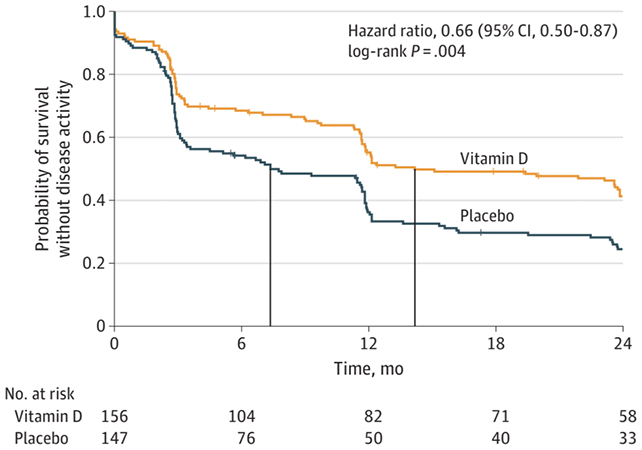Researchers from institutions across France have uncovered solid clinical evidence that supplements of vitamin D could be an effective treatment for the neurodegenerative condition multiple sclerosis (MS).
Found in a small number of foods such as fatty fish, eggs, and to some degree mushrooms, vitamin D is typically converted from other compounds in our body on exposure to sunlight. However we get it, the chemical plays an important role in absorbing calcium from the gut, as well as immune functions, cell growth, metabolism, and neuromuscular activity.
Vitamin D deficiency has previously been identified as a risk factor for MS, a condition in which the body attacks the protective sheaths surrounding its own nerve cells. So researchers conducted a trial with 303 participants diagnosed with clinically isolated syndrome (CIS); a condition that is in some ways similar to, and often develops into, MS.
Giving just over half of the volunteers a hefty fortnightly dose of vitamin D supplements (cholecalciferol) and the other half a placebo over the course of two years, the researchers found those in the vitamin group showed fewer lesions on the brain and spinal cord.
Disease activity was observed in 60.3 percent of the vitamin D group and 74.1 percent of the placebo group.

"This randomized clinical trial showed that high-dose cholecalciferol monotherapy initiated within 90 days after diagnosis of CIS strongly suggestive of MS reduced disease activity significantly compared with placebo," write the researchers in their published paper.
The findings were considered statistically significant enough to confirm vitamin D could help prevent at least some of the damage done by CIS and MS as the immune system attacks the body.
The researchers were also able to characterize the participants who saw the most improvement: those with a severe vitamin D deficiency (as you might expect), those with normal BMI, and those without any spinal lesions at the start of the trial.
"Altogether, this suggests that cholecalciferol could represent an inexpensive therapeutic alternative, with low risk of adverse events, after a CIS, especially in populations with limited access to disease-modifying therapies," write the researchers.
It's a promising step forward for vitamin D as a potential MS treatment, though unanswered questions remain.
Conclusions were largely based on measures of the damage done to the central nervous system, as detected by magnetic resonance imaging scans. In terms of symptoms corresponding with MS, there was a much smaller gap between the groups. What's more, the difference in relapse rates between the two groups was found to be non-significant.
The researchers are also keen to run further tests on how effective this level of vitamin D dosage can be.
More work also needs to be done in terms of understanding the mechanisms involved here and the potential risks: we know that vitamin D can boost the immune system in certain ways, and that MS is caused by a misfiring immune system, but future studies will be needed to figure out exactly what the relationship is.
Efforts continue to find ways to cure or reverse MS, and progress is being made – in terms of identifying risk factors for the disease, limiting the damage it does to the body, and understanding how it gets started.
"These results warrant further investigation, including the potential role of pulse high-dose vitamin D as an add-on therapy," write the researchers.
The research has been published in JAMA.
